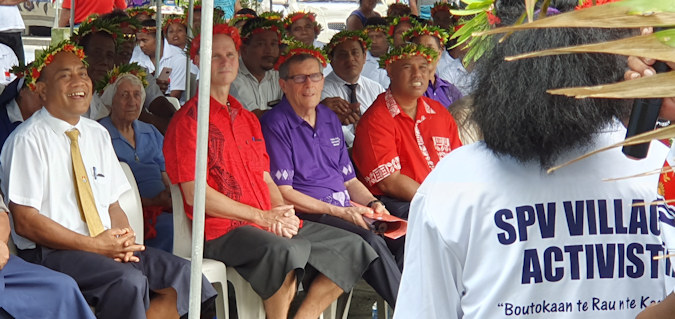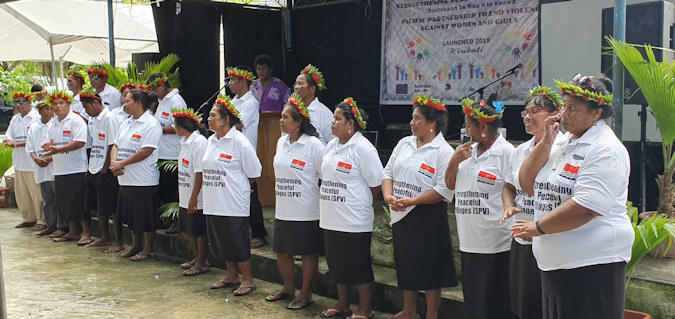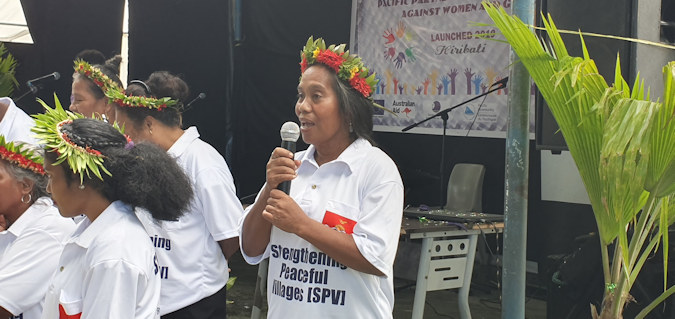President to launch the Strengthening Peaceful Village project to support safer homes and villages free from domestic violence
Date:
[Media Release]
Tarawa, Kiribati – More than 90 people living in villages in South Tarawa are taking the lead to promote gender equality and to ensure safe and peaceful families and homes.
The villagers are volunteering to be ‘village activists’ for the Strengthening Peaceful Villages (SPV) project that was officially launched today at a national event attended by the President of the Republic of Kiribati, His Excellency Taneti Maamau.

The SPV project is led by the Ministry of Women, Youth, Sport and Social Affairs (MWYSSA) partnering with UN Women through the Pacific Partnership to End Violence Against Women and Girls (Pacific Partnership), funded by the European Union and Australian Government with support from UN Women.
SPV is designed specifically for Kiribati, supported by tools adapted from the Raising Voices SASA! community mobilisation model that has demonstrated success, reducing rates of intimate partner violence by 52 per cent.
“As a nation we can be proud of this Strengthening Peaceful Villages (SPV) project, as a unique initiative developed by Kiribati people and specifically for the Kiribati context,” said His Excellency Taneti Maamau, President of the Republic of Kiribati.
“I am overwhelmed by the incredible efforts of the 90 people who are volunteering their personal time as ‘village activists’, to help make their villages more respectful of women and men equally, while promoting safe and peaceful families and homes.
“Unfortunately in many of our villages, some people think that domestic violence is acceptable and normal within relationships and families, but this is not normal nor okay and we must work together to no longer accept such behaviour in our homes and villages.
“Through this Strengthening Peaceful Villages project we can change our mindsets and revive the parts of our Kiribati culture that promote peaceful, caring and respectful relationships and united families who are free from violence. In doing so will lead to more peace, security and development in our villages and in our nation.”

H.E Te Beretitenti also congratulated and commended the Ministry of Women, Youth, Sports and Social Affairs through its Women’s Development Division for leading this SPV project, and in partnership with UN Women who provided invaluable technical and training support, as well as funding through Pacific Partnership and its donors: the European Union and Australian Government.
The official launch of the SPV project was held at Bairiki Square in Tarawa, on Friday 21 June 2019, together with the national launch in Kiribati of the Pacific Partnership to End Violence Against Women and Girls (Pacific Partnership), which funds the SPV project and other initiatives in Kiribati aiming to prevent violence against women and girls.
The four-year Strengthening Peaceful Villages (SPV) programme is unique in that it takes a village-led approach to preventing violence against women and girls working across 21 villages in South Tarawa and Betio - reaching half of the country’s population (approximately 56,385 people).
The SPV programme, which has completed its planning stage thanks to support from UN Women and the Australian Government, is now ready to launch into implementation across the 21 target villages with funding support from the Pacific Partnership.
The MWYSSA-led SPV project is the government’s largest ever effort to prevent violence against women and girls, and is central to the government’s commitment to address violence prevention as a top national priority.

“Violence in our families and homes effects everyone in the community. This village-led project focuses on raising the awareness of community members about the imbalance of power between women and men, and how this causes violence against women and girls. This power imbalance exists because community members are unaware, accept it or are just silent about it. For this situation to change, we will need to begin that change ourselves,” said Karawa Areieta, SPV Team Leader, Ministry of Women Youth, Sport and Social Affairs (MWYSSA).
“This is achieved by engaging women and men, girls and boys, cultural and religious leaders, local officials, police, health-care providers and others to reflect on their own lives and relationships and how women and men, girls and boys, can live in harmony and happiness, without the horrendous impacts of domestic violence.”
Media enquiries:
- Teata A Wilson – teatawilson32@gmail.com (73007135) Domestic Violence Officer - Ministry of Women Youth, Sport and Social Affairs (MWYSSA)
BACKGROUND INFORMATION:
Pacific Partnership to End Violence Against Women and Girls: The Pacific Partnership to End Violence Against Women and Girls (Pacific Partnership) brings together governments, civil society organisations, communities and other partners to promote gender equality, prevent violence against women and girls (VAWG), and increase access to quality response services for survivors. The programme will build on the decades of work led in the region by civil society and governments to address this issue.
The EUR 19.5million programme is funded primarily by the European Union (EUR12.7m) with targeted support from the Australian Government (EUR6.2m) and cost-sharing from UN Women (EUR0.6m). It is being jointly coordinated by the Pacific Community (SPC), the Pacific Islands Forum Secretariat (Forum Secretariat) and UN Women Fiji Multi-Country Office.
